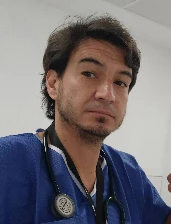3222 - Prognostic Factors for Recurrence and Survival in Bladder-Preserving Therapy for Muscle-Invasive Bladder Cancer
Presenter(s)

N. Feltes1, S. Paredes1, P. Peleteiro Higuero2, A. Mena Errasti3, G. Molina4, A. Aissati5, A. Folgar-Torres6, J. Pastor Peidro7, C. Gil Restrepo8, S. Fernández Alonso9, A. Lazo Prados10, J. Mases Rosines11, P. Willisch Santamaria12, V. Duque-Santana13,14, M. Gaztanaga Boronat15, J. Torices16, J. Fernandez Lopez17, I. Ribeiro18, A. Rodriguez Perez19, and E. Gonzalez D20; 1Hospital Universitario de Terrassa ( CST ), Terrassa, Barcelona, Spain, 2Hospital Clínico Universitario Santiago de Compostela, Santiago de Compostela, Galicia, Spain, 3Hospital Sant Pau i la Creu, Barcelona, Barcelona, Spain, 4Catalan Institute of Oncology. Badalona. Barcelona. Catalonia, Badalona, Spain, 5Hospital Universitari Doctor Josep Trueta- Institut Català d'Oncologia, Girona, Girona, Spain, 6Hospital Universitario Lucus Augusti, Lugo, Galicia, Spain, 7ASCIRES Grupo Biomedico, Valencia, Valencia, Spain, 8Hospital de Zamora, Zamora, Zamora, Spain, 9Hospital Universitario 12 de Octubre, Madrid, Spain, 10Hospital Universitario Virgen de la Victoria, Malaga, Malaga, Spain, 11Hospital Clinic, Barcelona, Barcelona, Spain, 12HOSPITAL MEIXOEIRO (CHUVI), VIGO, Spain, 13Quironsalud Madrid University Hospital. Radiation Therapy Department, Madrid, Spain, 14Medicine Department, School of Biomedical Sciences, Universidad Europea, Madrid, Spain, 15Hospital Clínico Universitario San Carlos, Madrid, Madrid, Spain, 16Hospital Quiron, Radiation Oncology department, Barcelona, Spain, 17Hospital de Albacete, Albacete, Albacete, Spain, 18Hospital Universitario de Gran Canaria Dr. Negrín, Las Palmas de Gran Canaria, Canarias, Spain, 19Ruber Internacional, Madrid, Madrid, Spain, 20Hospital Universitario La Paz, Madrid, Madrid, Spain
Purpose/Objective(s): Bladder-preserving trimodal therapy (TMT), combining transurethral resection of the bladder tumor (TURBT), radiotherapy (RT), and concurrent chemotherapy (QT), is a well-established alternative to radical cystectomy for muscle-invasive bladder cancer (MIBC). This multicenter, retrospective study aims to identify prognostic factors influencing tumor response, local recurrence, and survival, hypothesizing that RT dose and image-guided RT (IGRT) techniques significantly impact outcomes.
Materials/Methods: The study included 452 patients (median age: 75.8 years) from a multi-institution database. Clinical and treatment-related variables were analyzed, including RT dose, QT use, and IGRT techniques. Most patients had urothelial carcinoma (90.7%) with pT2 stage (91.4%), and carcinoma in situ (CIS) was present in 13.7%. QT, primarily cisplatin-based (53%), was administered to 76% of patients. Pelvic RT was delivered to 65%, with normofractionated RT in 71.5% and hypofractionated RT in 24.9%. Mean RT dose was 60.48 Gy. Daily cone-beam computed tomography (CBCT) was the most frequently employed technique (261 patients). Logistic regression models analyzed tumor response, recurrence, and survival outcomes.
Results:
- Local Recurrence: Daily CBCT significantly improved complete response rates (p < 0.001). RT dose was associated with reduced recurrence (p = 0.0055 univariable, p = 0.0079 multivariable).
- Survival Analysis:
- 2-year overall survival: 48.2%; 5-year overall survival: 12.3%; 5-year local recurrence-free survival: 14.1%.
- RT dose and daily CBCT-based IGRT were strongly associated with overall survival (p < 0.05).
- QT did not significantly impact cancer-specific survival (p > 0.05).
- Hazard Ratio (HR): Patients achieving a complete response had a significantly lower risk of cancer-specific mortality (HR = 1.88, p < 0.001).
Conclusion: This study highlights the critical role of RT dose and IGRT in optimizing tumor control and survival outcomes in bladder-preserving therapy for MIBC. Higher RT doses and daily CBCT-based IGRT were associated with improved outcomes, while QT did not significantly impact cancer-specific survival. These findings advocate for personalized RT optimization and the use of daily CBCT to enhance treatment efficacy, offering valuable implications for clinical practice.
